
Victor Varconi was a Hungarian actor who initially found success in his native country, as well as in Germany and Austria, in silent films, before relocating to the United States, where he continued to appear in films throughout the sound era. He also appeared in British and Italian films.

The Plastic Age is a 1925 American black-and-white silent romantic comedy film directed by Wesley Ruggles and starring Clara Bow, Donald Keith, and Gilbert Roland. The film was based on a best-selling novel from 1924 of the same name, written by Percy Marks, a Brown University English instructor who chronicled the life of the fast-set of that university and used the fictitious Sanford College as a backdrop. The Plastic Age is known to most silent film fans as the very first hit of Clara Bow's career, and helped jumpstart her fast rise to stardom. Frederica Sagor Maas and Eve Unsell adapted the book for the screen.
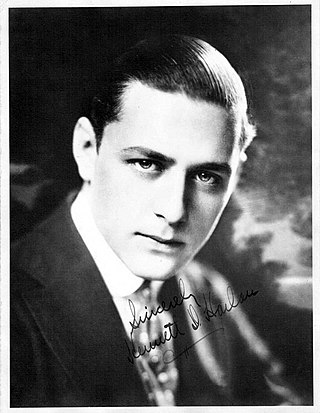
Kenneth Daniel Harlan was a popular American actor during the silent film era, playing mostly romantic leads or adventurer roles. His career extended into the sound film era, but during that span he rarely commanded leading-man roles, and became mostly a supporting or character actor.

Evelyn Selbie was an American stage actress and performer in both silent and sound films.

Changing Husbands is a 1924 American silent comedy film starring Leatrice Joy and Victor Varconi, directed by Paul Iribe and Frank Urson, and written by Sada Cowan and Howard Higgin. The runtime of the film is 70 minutes.

Louis Joseph Gasnier was a French-American film director, producer, screenwriter and stage actor. A cinema pioneer, Gasnier shepherded the early career of comedian Max Linder, co-directed the enormously successful film serial The Perils of Pauline (1914) and capped his output with the notorious low-budget exploitation film Reefer Madness (1936) which was both a critical and box office failure.

White Man is a lost 1924 American silent drama film directed by Louis J. Gasnier and is set in a diamond mine in South Africa. It was Clark Gable's film debut.

Laura La Varnie was an American actress of the silent era. She appeared in more than 80 films between 1913 and 1930. She was born in Jefferson City, Missouri and died in Los Angeles, California.
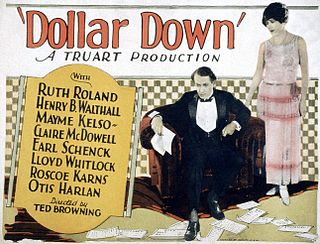
Dollar Down is a 1925 American silent drama film directed by Tod Browning. A print in the UCLA Film and Television Archive has one of its six reels missing. Filmed in April 1924 at the F.B.O Studios in Santa Monica, California, Dollar Down was the first of two features produced by star Ruth Roland and Browning's production company, Co-Artists Productions.

George Beranger, also known as André Beranger, was an Australian silent film actor and director in Hollywood. He is also sometimes credited under the pseudonym George André de Beranger.

Wine is a 1924 American silent melodrama film directed by Louis J. Gasnier, produced and released by Universal Pictures under their 'Jewel' banner. The film, which featured Clara Bow in her first starring role, is currently classified as lost.

Main Street is a 1923 American silent drama film based on the 1920 novel of the same name by Sinclair Lewis. It was produced and distributed by Warner Bros. and directed by Harry Beaumont. A Broadway play version of the novel was produced in 1921. It was the first film to be released after the foundation of Warner Bros. Pictures on April 4, 1923.
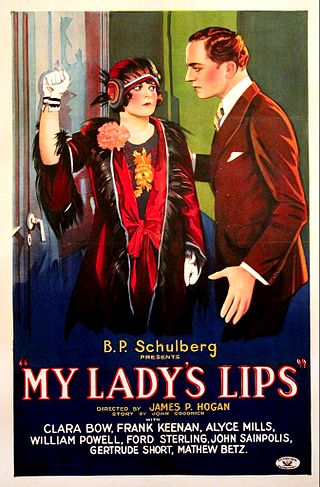
My Lady's Lips is a 1925 American silent drama film written by John F. Goodrich and directed by James P. Hogan for B.P. Schulberg and his company Preferred Pictures. The film stars Alyce Mills, and represents an early role for actress Clara Bow. It is the tenth ever film for William Powell, and the first of only two films where Powell and Bow worked together.

Parisian Love is a black and white 1925 American silent romantic crime drama film directed by Louis J. Gasnier and starring Clara Bow. The film was produced by B.P. Schulberg Productions. A copy of this film still survives.
Daughters of Pleasure is a 1924 American silent romantic comedy film directed by William Beaudine and starring Marie Prevost and Monte Blue. Based on a story by Caleb Proctor, the film features an early appearance by Clara Bow who plays a supporting role.

Clara Bow (1905–1965) was a 16-year-old living in the New York City borough of Brooklyn when she won the 1921 nationwide "Fame and Fortune Contest" advertised in Motion Picture Magazine. After submitting their photographs with a completed entry form clipped from the magazine, finalists were given multiple screen tests. As the winner, she was cast in a small role in the silent era film Beyond the Rainbow. Although her part was eventually edited out, the contest inspired her to pursue an acting career. She relocated to Los Angeles and signed with producer B.P. Schulberg. Her 1927 starring role in It, about an attractive and charismatic young woman, led the public to label Bow the "It girl". Over the next two decades, she would make more than 40 silent era films, the majority of them under contract to Paramount Pictures.
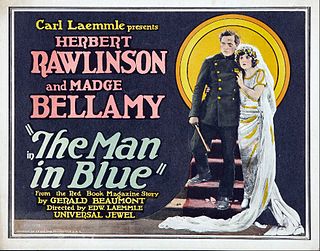
The Man in Blue is a 1925 American silent drama film directed by Edward Laemmle and starring Herbert Rawlinson. The film is based upon a short story by Gerald Beaumont published in the March 1924 issue of Red Book. It was produced and distributed by Universal Pictures.

Innocence is a lost 1923 American silent drama film directed by Edward J. Le Saint and starring Anna Q. Nilsson. The film was released by the CBC Film Sales Corporation, which would later become Columbia Pictures.
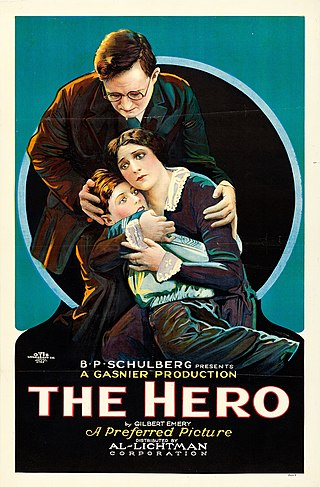
Preferred Pictures was an American film production company of the silent era. Founded in 1920 by the producer B. P. Schulberg following his departure from Paramount Pictures, it was an independent, either distributing its own films or releasing them through First National Pictures. Schulberg's partners were J.G. Bachmann and Al Lichtman, and many of the company's earliest productions featured the actress Katherine MacDonald. She was replaced as the company's leading star by Clara Bow.

The Law Forbids is a 1924 American drama film directed by Jess Robbins and written by Lois Zellner and Ford Beebe. The film stars Baby Peggy, Robert Ellis, Elinor Fair, Winifred Bryson, James Corrigan, and Anna Dodge. The film was released on April 7, 1924, by Universal Pictures.




















